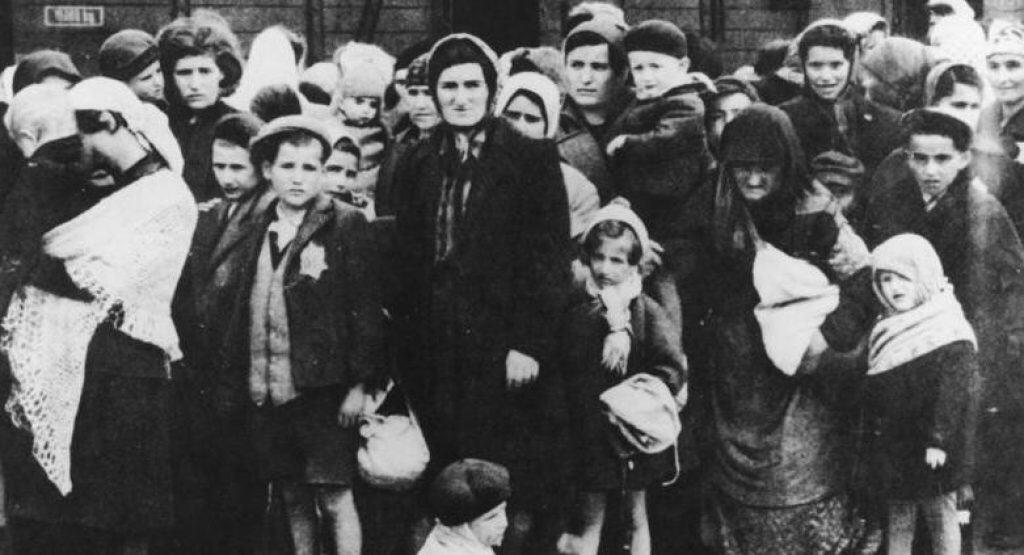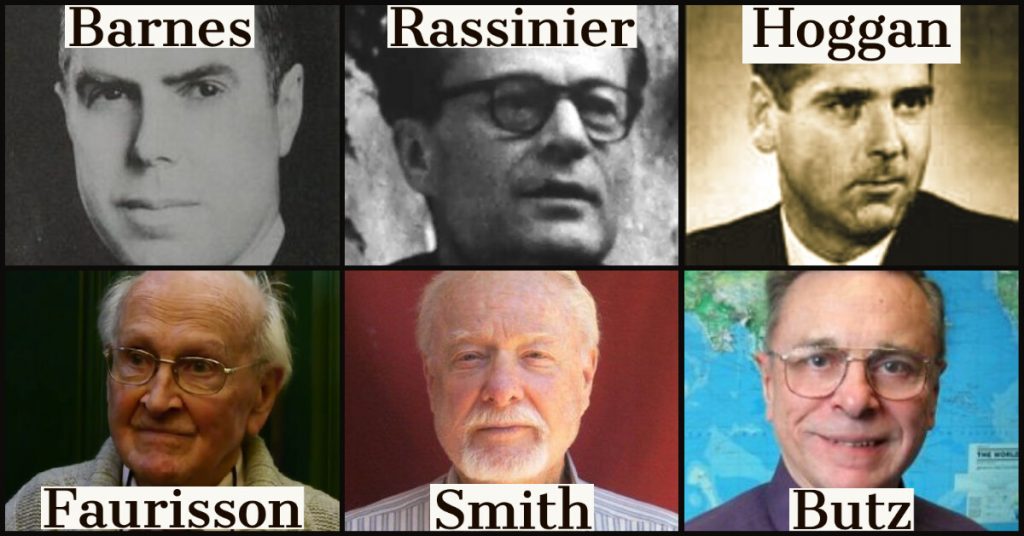Who Were the Fathers of Holocaust Revisionism and Denial?
Holocaust revisionism and Holocaust denial are alive and well, even today. A number of people deny that the Holocaust ever existed, that the Nazis exterminated millions of Jewish people, and that they died in gas chambers. Holocaust revisionism pertains to the idea that the Holocaust didn’t quite happen the way the Jews said it did. Supporters of revisionism and denial believe the Jews falsified either the entire story or parts of the of story of the Holocaust to promote themselves.

It doesn’t matter that the historical evidence speaks of horrible atrocities committed during WWII against the Jews. It doesn’t matter that so many people lived through the war to tell their stories. And certainly, it doesn’t matter that there were Nazis who testified about their killings.
Why Holocaust Revisionism and Denial Are Controversial
The denial and revisionist ideas are controversial subjects for many reasons. The knee-jerk reason being sympathy for victims of the Holocaust and their families. After that, people who accept what they have learned about the Holocaust as truth tend to be shocked that anyone would deny such a well-documented and tragic event. It is also touchy because some of the arguments Holocaust revisionists and deniers present are really irrelevant and disrespectful to those who bore witness to the atrocities committed during Hitler’s regime. An article in BBC by Deborah Lipstadt in 2011 presented a detailed analysis of the philosophies of Holocaust deniers:
Some even claim that Hitler was the best friend the Jews had in Germany and that he actively worked to protect them. According to deniers, Jews have perpetrated this hoax about the Holocaust on the world in order to gain political and financial advantage, and it was in fact Germany that was the true victim in World War Two.
BBC, 2011
Holocaust experts and historians must shed light on the actual details of the Holocaust as they happened. The endless documents and testimonies need to be studied thoroughly so that history is not lost. However, many Holocaust deniers call Jews liars. These are the people who bore witness to the tragedy and lived to tell their stories. This is where a want for historical accuracy meets anti-Semitism. Here are some of the men who ushered in the revisionist movement.
Holocaust Revisionism Founders

(Bottom L to R) Robert Faurisson, Bradley R. Smith, and Arthur Butz.
Henry Elmer Barnes (B. 1889 – D. 1968)
Henry Elmer Barnes was a native of New York. He attended Syracuse University, from which he graduated in 1913. He went on to earn his Ph.D. at Columbia University. From there, he taught at a number of universities and began writing books and articles. From the start of his writing and social commentary, Barnes was a controversial figure. He sought historical revision of not only WWII and the Holocaust, but also WWI and the Cold War. His message was not necessarily anti-Semitic as much as it was anti-war and anti-American, in many ways.
During a time when the United States was very proud of its military, there was a lot of emphasis placed on patriotism. Henry Elmer Barnes was disagreeing with the United States’ involvement in both World Wars. In some ways, he painted Germany as a victimized country, with emphasis on the Treaty of Versailles. His desire was to change people’s perspective on the world wars. Additionally, he felt that Pearl Harbor was not a good reason to join World War II. He thought the way in which the United States entered the war was deceitful. Henry Elmer Barnes thought the United States was headed toward a 1984 by George Orwell-like existence. .
Among Holocaust revisionists, Henry Elmer Barnes was the least of the wolves, so to speak. He supported the writings of some other authors who clearly denied things like genocide and gas chambers as they pertained to the Holocaust, but he did not write anything along those lines himself. It seemed he wanted to change the way people viewed the world wars more than he wanted to change people’s opinions of Jews. In other words, he was not overtly anti-Semitic like some of the new age Holocaust revisionists.
Paul Rassinier (B. 1906 – D. 1967)
Paul Rassinier went much further than Henry Elmer Barnes did in his denial of Holocaust history, as we know it. Interestingly, he was a French political prisoner of the Nazis during the Holocaust. He was held at Buchenwald in Germany at one point during his captivity. He wrote that he never saw any gas chambers. This makes sense, as there were no gas chambers at Buchenwald. You do not have to be a revisionist to believe that fact. Nonetheless, he took his experience to mean that there were no gas chambers. He also claimed that the atrocities committed in German concentration camps were carried out by blockalteste and other inmates, not by the Germans.
What Happened to Raoul Wallenberg?
Paul Rassinier’s claims that there were no gas chambers are widely disputed by those who witnessed or even operated them. Even if he were right (which is a matter of heated debate in revisionist circles), a lack of gas chambers does not mean a lack of murders. This leads us to his next noteworthy claim; that the Germans did not commit the murders that took place in concentration camps. This is demonstrably false. There is overwhelming evidence that Jews, homosexuals, prisoners of war, the infirm, gypsies, and more were murdered at the hands of the Germans while being kept in concentration camps. The idea that so many people have lied and that existing proof is somehow faked is offensive to many.
David Hoggan (B. 1923 – D. 1988)
David Hoggan is the author of “The Myth of the Six Million.” He was born in the United States and received his education at Reed College and Harvard University, where he earned his Ph.D. Many of his views may have been slightly biased, due to his apparent love for Germany. He stayed there for three years and brought back with him a German bride. He taught at many universities and he was obviously a well-educated man.But his views on the Holocaust have been contested successfully. Nonetheless, he remains a favorite of modern Holocaust Deniers and Holocaust Revisionists
Robert Faurisson (B. 1929)
Robert Faurisson was born in England, but grew up in France. Some of his views include a dismissal of the gas chamber eyewitness testimony, dismissal of Rudolph Hess’ testimony given to the British, and the testimony of Holocaust survivor Elie Wiesel. He has even questioned the validity of The Diary of Anne Frank (Amazon Link), one of the most beloved and oft-read books to come out of the Holocaust.
While Robert Faurisson denies some rather obvious truths, he does not deny the Holocaust altogether. He is one of the revisionists who realize that the Germans treated people terribly. Nonetheless, he feels history reveals poor documentation.
Bradley R. Smith (B. 1930)
Bradley R. Smith was born in Los Angeles. He went on to become a deputy sheriff (until hepatitis rendered him ill) and later, a controversial bookstore owner. He has no formal scholarly qualifications, but he is a prominent figure in Holocaust Revisionism.
In 1979, the writings of Robert Faurisson significantly influenced Bradley R. Smith. He soon became a revisionist. He currently has connections with both the “Institute for Historical Review” and “The Committee for Open Debate on the Holocaust.” Both of these organizations are primarily about Holocaust Revisionism. Smith claims that there was no policy of mass murder in Hitler’s regime and that there were no gas chambers. He claims that he does not deny the Holocaust altogether.
Arthur Butz (B. 1933)
Arthur Butz attended the Massachusetts Institute of Technology and received his Ph.D. from the University of Minnesota. His education was in sciences, particularly engineering. He has no formal education that would aid him in his historical endeavors.
Butz is a tenured professor at the Northwestern University. He teaches electrical engineering, not history. This is good because he is also the author of a book called “The Hoax of the Twentieth Century: The Case against the Presumed Extermination of European Jewry.” He claims that the Holocaust was a hoax perpetrated by the Jews in order to gain sympathy for the establishment of the State of Israel in 1948. Butz has even commended President Ahmadinejad’s public denial of the Holocaust.
* The President of Northwestern University has gone on record to say that Arthur Butz does not speak about his Holocaust denial in the classroom and they do not support his views, only his right to express them in his personal time.
The Moot Point of Revisionism vs. Denial
There is a very fine line between Holocaust denial and Holocaust revisionism. Revisionists tend to emphasize the fact that they only deny certain aspects of the Holocaust, not the entire Holocaust. It seems a moot distinction. People dying in concentration camps of disease or starvation because they were detained for their ethnicity still fits the definition of genocide, regardless. Gas chambers or no gas chambers, policy of genocide or no policy of genocide, genocide still took place.
*Shelly Barclay does not share the beliefs of the men listed above.
Sources:
Jewish Virtual Library, retrieved 3 January 2011.
Harry Elmer Barnes, Revisionism and the Historical Blackout, retrieved 3 January 2011
Inside Higher Ed, A Holocaust Denier Resurfaces, 8 February 2006.
Article updated 9/28/16